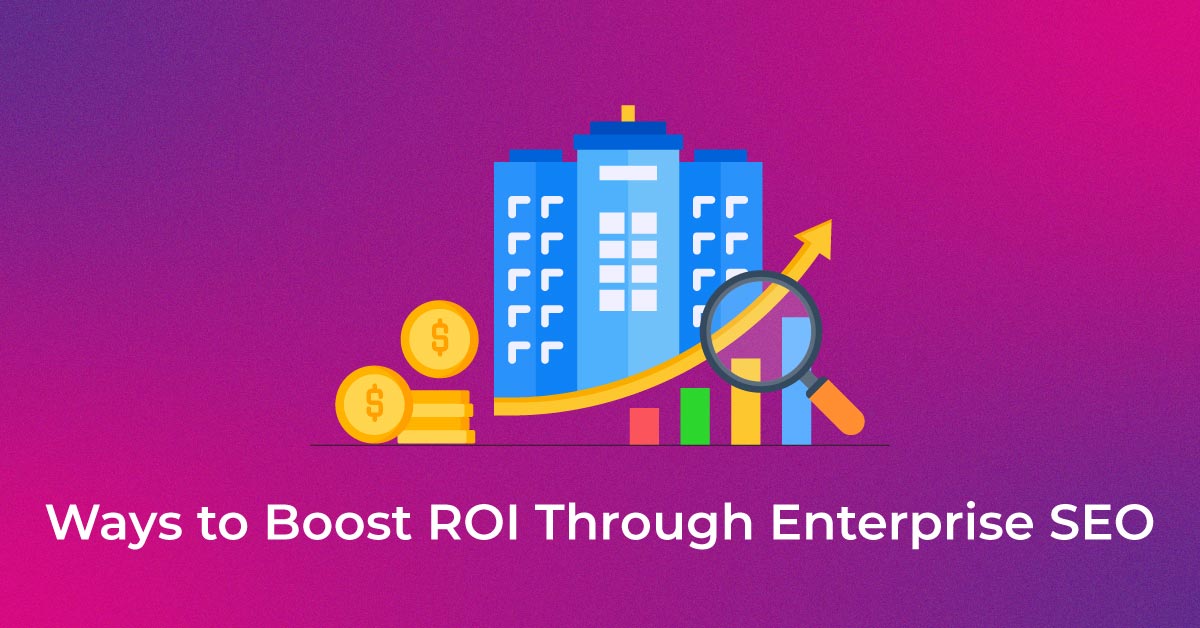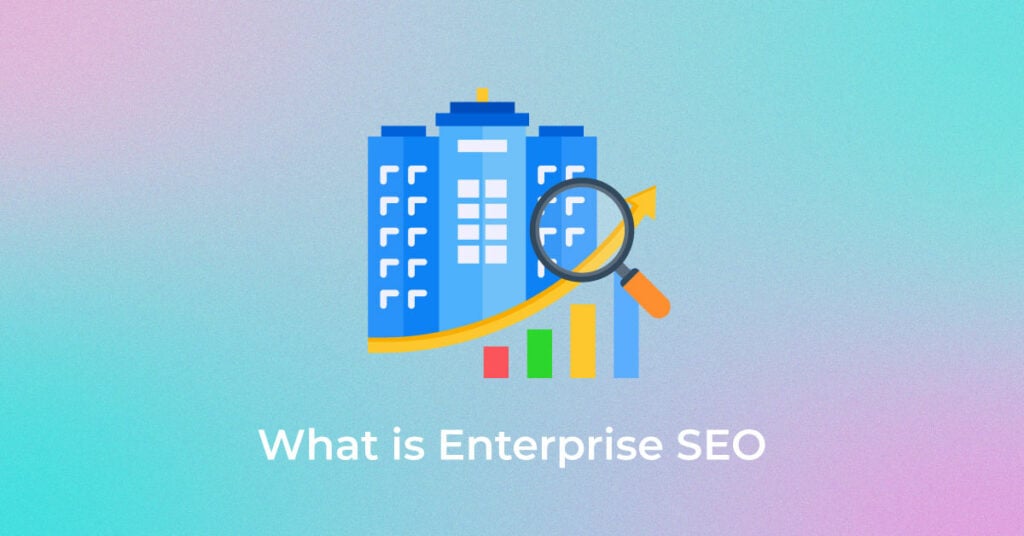Nearly 89% of marketers use SEO to improve search rankings, but not all strategies suit every business. For large organizations managing thousands of webpages, Enterprise SEO offers a tailored approach that aligns with broader business goals. It focuses on scalable content, automation, and technical SEO to enhance visibility, brand authority, and market share. This strategy also supports public relations, improves brand reputation, and helps track key metrics like Customer Acquisition Costs (CAC). Let’s dive deeper to understand what Enterprise SEO is and how it can benefit your business.
What is Enterprise SEO?
Enterprise SEO is a strategic approach to search engine optimization designed for large websites with thousands of pages. It focuses on improving visibility, traffic, and performance at scale while aligning with broader business goals. Unlike traditional SEO, it involves advanced tactics like automation, scalable content creation, technical SEO management, and cross-team collaboration.
This approach helps large organizations manage complex site structures, target high-volume keywords, and maintain consistent SEO performance across multiple departments or business units. In short, Enterprise SEO ensures that even the largest digital ecosystems remain optimized, discoverable, and competitive in search results.
What is an Enterprise Website?
An enterprise site refers to a website that has a large volume of Web pages under a single domain. An enterprise-level website benefits businesses in several ways. This website allows you to promote your products and services to a wider audience.
Many people assume that ranking a website like this is difficult. However, while the ranking method is somewhat complicated, there is more room to boost the site’s visibility with so many pages targeting various keywords, products, and services.
If you have an enterprise-level website, make sure it has a user-friendly Web design, faster load time, and improved call to action (CTA), among other features.
Why is Enterprise SEO important?
A good SEO strategy guarantees your company’s long-term success. It boosts your company’s return on investment (ROI) by increasing traffic and clicks. Here are a few examples of why SEO is so important.
- SEO ensures that anyone who is searching for a product related to your business finds you. Without SEO, it will be difficult to be found. A robust enterprise SEO strategy will assist you in reaching out to potential customers.
- SEO enterprises help raise brand awareness through informative off-page and on-page content. The different forms of content allow people to know about your company and its services in more detail. It also aids in the acquisition of links from trustworthy and authoritative websites.
- Enterprise SEO strategy also focuses on competitor analysis. This method can assist you in determining what is helping your peers rank higher on the website. You will also learn what kind of material they are publishing, what keywords they are aiming for, and from where they are getting their links.
- A good enterprise SEO service may also assist you in generating high-quality leads. Since SEO focuses on enhancing user experience, page responsiveness, identifying scope, and developing high-quality content, there is a good chance that visitors will become buyers.
Difference between Enterprise SEO and Small Business SEO
The key difference between Enterprise SEO services and small business SEO is scalability and approach. Small business SEO is an easier procedure because it focuses on fewer pages and keywords with little competition. Enterprise-level business, on the other hand, competes on highly competitive keywords. They also make an effort to rank for long-tail keywords.
Furthermore, an enterprise-level site audit is a comprehensive procedure. You must identify the issues with meta tags, page indexation, and keywords on every page. You will also need to compare each page to those of your competitors.
If you choose a strategy similar to that used by small businesses, the procedure will not only take a long time, the results will not be what you need or what you expected.
What Enterprise SEO Includes
1) Automated site audits
An enterprise SEO audit is an in-depth examination of the factors that influence a site’s search rankings. The following pointers are the focus of an automated audit.
- Targeting keywords: to examines whether the keywords used aid in the generation of high-quality leads.
- Page indexation: to look for pages that are not showing up in search results because they haven’t been indexed.
- URL check: to scan your URL to see if it contains keywords and matches the content intent.
- Title tags: to check if the title tags are unique and that the characters do not exceed the limit.
It also checks meta descriptions, links, and the site’s performance.
2) High-volume keywords
Enterprise SEO’s keyword strategy differs from that of traditional SEO. You will need to monitor the keywords on which your competitors are ranking. And you should also figure out how to outrank them. Here’s how enterprise SEO strategy works on this factor.
- It filters the brand keywords to prevent you from utilising competitors’ company keywords.
- It searches for high-volume keywords that can deliver results quickly.
- It looks for pages with keywords—but not enough content length—to rank.
- It also prioritises featured snippet optimisation and the inclusion of “people also ask” queries in the content.
3) Competitor analysis
Ranking on a search engine is impossible if you are unaware of what your competitors are doing, regardless of your business size. Enterprise-level competitor analysis is an extensive process. Here is how you should approach it:
- As a first step, determine who your true peers are.
- In the next step, identify pages for comparison. Some key pages in this process are landing pages, home pages, product pages, application pages, and knowledge center pages.
- Also include a review of the website’s design, content pages, keyword gaps, and more.
4) Content optimisation
Content optimisation refers to the presentation of content in a way that a search engine can comprehend. Under this process, the main focus is to make content appealing and user-friendly. Enterprise SEO strategy uses the following approach for optimising content.
- It emphasises conducting in-depth research to identify the right keywords.
- It updates existing content with new trending or missing keywords.
- It focuses on adding internal links to the existing content.
- It works on adding images or videos to the content wherever possible.
- It also includes creating keyword-rich meta descriptions and title tags.
5) Technical SEO Management
Enterprise websites require strong technical SEO to handle thousands of pages. Key tasks include improving crawlability, fixing site speed issues, managing indexation, and ensuring mobile-friendliness—all critical for search visibility and long-term performance.
6) Link Building for Enterprises
Enterprise link building focuses on acquiring high-authority backlinks at scale. This includes digital PR, brand mentions, and partnerships. A strong backlink profile boosts domain authority, supports rankings, and builds trust with both users and search engines.
Building a Scalable Enterprise SEO Strategy
1) Setting SEO Goals Across Departments
Aligning SEO goals with departments like marketing, tech, and product ensures everyone works toward shared KPIs. This unified approach streamlines execution, improves efficiency, and drives consistent growth across the organization.
2) Implementing Scalable Content Workflows
Scalable content workflows help teams create, optimize, and publish high-volume content efficiently. With clear roles, templates, and approval systems, enterprises can maintain quality while meeting large-scale content demands.
3) Leveraging Automation and AI
Automation and AI tools simplify repetitive SEO tasks like audits, reporting, and tagging. They boost speed, reduce manual effort, and free up teams to focus on strategic planning and content performance.
4) Enterprise SEO Project Management Tools
Tools like Asana, Trello, or Jira help manage SEO tasks, timelines, and team collaboration. They keep large-scale projects organized and ensure smooth communication across multiple departments.
Common Challenges in Enterprise SEO
Working on an enterprise-level website comes with several challenges. You will need to detect faults on each page to improve the website’s positioning on search engines.
For example, you will need to go over the content of each website. Check to see if the content contains relevant keywords and whether the content addresses customers’ problems.
You will also want to keep an eye on what your peers are doing in terms of online marketing. Since enterprise SEO is such a big thing, let’s go over the major issues one by one.
1) Crawlability and Indexability
Crawlability and indexability are two important factors that help your website become visible to people. The search engine uses bots or spiders to assess different aspects of Web pages. The process is commonly referred to as crawling. Once search engines have your data, they list the pages in the search index.
Now the major challenge that you as an SEO will face here is dealing with a large volume of pages. To solve the crawling problem, you will need to figure out which URLs are blacklisted by robots.txt. You will also need to look for 404 errors, SEO tag mistakes, and rendering issues.
After you have finished with the above, you will need to go over content with duplication issues. It is also crucial to detect low-priority crawl issues at the enterprise level. This includes internal linking, site structure, and page responsiveness across devices, especially smartphones.
In the context of indexing, the main issue is to resolve complex site coding and poor page load time. You will also need to identify the poorly written content that fails to pass any intent. You will also need to identify the pages that are causing redirect loops.
2) Legacy Site Issues
One of the biggest challenges is dealing with older sites. These websites contain elements that are no longer relevant.
Legacy sites have undergone far too many alterations over the years. You will need to perform the tedious task of preparing long reports of these changes. Also, because search algorithms have evolved, you have to put additional effort into identifying useless content, outdated URLs, old redirects, and more.
You will also have to replace existing landing pages with new ones that contain more trending keywords. In addition, check if the website is secure. If you discover that your website is HTTP://, change it to HTTPS; otherwise, your ranking will be adversely impacted.
Apart from that, you will also need to focus on no schema markup, irrelevant robots.txt files, subdomains, and a few others.
3) Multiple Locations
The concept of an enterprise-level website is broader. Depending on your industry, you may need to work in or for several places. For example, if you run a restaurant with franchise outlets across national and international borders, you will need to take a different approach.
In such cases, when increasing the franchise outlet’s visibility at a local level, you will focus on city-specific pages. Such as, XYZ restaurant in New York. At the same time, you will need to work on the entire website to improve its search engine rankings at a global level.
4) Multiple Sites and Subdomains
Working on an enterprise website necessitates working on several different sites and subdomains. For example, if you manage a company with a worldwide presence, you will need to employ a more strategic approach.
You will need to come up with content ideas that target the people’s pain in that specific location. You will need to develop material in a variety of languages. You will also need to run separate marketing efforts for other countries. Remember that, to be successful, each of these will necessitate a unique SEO marketing plan.
5) Scaling Fixes Across Templates
While traditional and enterprise SEO share fundamental principles, handling thousands of pages requires a distinct approach. Fixing keyword cannibalization on a small site may involve merging or removing pages, but in enterprise SEO, even minor fixes require stakeholder approvals and a solid business case.
Editing meta tags page-by-page isn’t feasible. Instead, optimizing templates helps manage elements like canonical and no-index tags efficiently.
With multiple teams working on the site, tracking changes becomes complex. A thorough site audit is critical to identify issues like broken links, crawl errors, and non-indexed pages. Monitoring KPIs is essential to ensure scalable, trackable progress across the entire website.
What Makes Enterprise SEO Different?
Enterprise SEO involves improving search engine rankings for enterprise-scale businesses. Enterprise SEO is different from conventional SEO because it requires businesses to scale their Enterprise SEO strategy. Enterprise SEO is used to optimize websites with thousands of pages such that search engines like Google and Bing can crawl and index them.
Mostly, large-scale businesses such as Fortune 500 companies, large e-commerce sites, multi-location businesses, and businesses with multiple sites have the capacity or reserves to engage in Enterprise SEO marketing. Some popular Enterprise SEO strategies include technical SEO management, scaling content, and automation.
Why Hire an Enterprise SEO Agency?
SEO agencies are specialists in crafting digital marketing strategies. They have dealt with several challenges that firms face when putting up an effective marketing strategy. These agencies have large teams.
As such, the agency assigns a small team of employees to your project, each with a distinct responsibility. For example, certain agency employees will be involved in the content creation process and will concentrate on identifying trending topics that can drive traffic.
They will also be in charge of developing keyword-rich content for various channels. Similarly, a team will be dedicated to site audits, competitive analysis, and other tasks.
Benefits of an Enterprise SEO Strategy
1) Improve customer reach
You will easily find loads of content on similar topics. Furthermore, countless websites offer products and services similar to yours. As such, you will need a good enterprise SEO strategy if you are seeking to reach out to your audience through blogs or websites. SEO-based marketing will assist you in identifying the most popular industry-related keywords. It will also assist you in finding the questions customers ask most frequently about your sector on search engines.
You can use this approach to reach out to potential customers. The approach will also aid in addressing the audience’s pain point.
2) Improve brand reputation
If you believe SEO and branding are unrelated, please reconsider right away. Whether you want to establish a local or international reputation, you will need enterprise SEO.
SEO improves your site’s position on search engines. If someone looks for a product or inquires about anything in your business sector, and your Web page has an answer, SEO can assist your page in becoming visible to the audience. Integrating SEO into your company’s objective can help you get more clicks and quality leads.
3) Get quality backlinks
Link building is one of the most important aspects of marketing. It is the way of acquiring links to your website from other websites. An enterprise-level SEO focuses on linking building as well. It assists you in obtaining high-quality backlinks by employing the following strategies:
- Developing and publishing high-quality, informative content on your website
- Determining which websites are most likely to link to your company’s website
- Determining the sources from which your competitors acquire the link
- Repairing links that are faulty or broken
4) Increase conversion
Search engine optimisation and conversion rate optimisation go hand in hand. It’s because they are both centred on two fundamental principles: first, they figure out what your users want, and then they provide a solution to their problems. Enterprise SEO increases the conversion rate by:
- Increasing page load speed to provide a more user-friendly experience for customers while also minimising the bounce rate
- Considering the fact that customers spend more time on websites that have videos and graphics
- Bridging the gap between your brand and your customers by including a strong call to action (CTA).
Conclusion:
A well-executed SEO strategy can propel your company to new heights. It enables you to generate more organic leads with a high conversion rate. However, enterprise SEO is a complex process. As such, you must seek the assistance of an agency that specialises in providing enterprise SEO services. Such agencies increase your online visibility as well as increase the ROI of your company.
Popular Searches
How useful was this post?
0 / 5. 0













